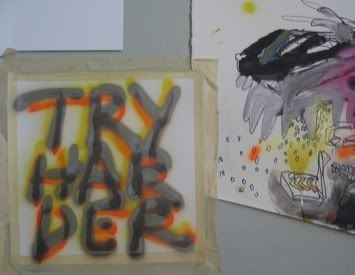Criticism has a rebuttal
In my previous post about art criticism and linking the Metro Times article on the Judy Pfaff show I received a response from Rebecca who co-wrote the article. She didn't mind if I posted her comments so here ya go. I think it is only fair to keep the debate going!
You bring up some good issues, but I need to make a couple of points:
1) Opinion alone does not make for criticism. First and foremost, criticism is analysis. So qualifying something as bad or good doesn't make it more relevant than one that doesn't make that judgment, perhaps just more interesting -- but not always. Someone who's always offering an opinion and little analysis? Jerry Saltz.
2) Why not analyze a bad show? Because most of the weak art in Detroit is not simply bad, it's boring. There's a huge difference there. Bad art invites questions and comments. Boring art leaves its audience with absolutely nothing to say, and is usually a result of looking at work by an artist who has nothing to say. Speaking of boring, I'm befluxed and beflummoxed that you could call the Pfaff show boring! It's one of the most fascinating shows I've seen in a long while, and believe that non-art lovers could appreciate it too, since it's not art about art. It's art about philosophy and science.
( ann: I didn't mean to not analyze a bad show...I agree that a bad show makes for a better show than a boring show. I just think that Pfaff's imagery didn't appeal to me despite the story behind it...I just don't think layered paper with punched holes is very engaging. Yes...her installations are interesting but these just look like decorative floral collage prints that I sell to interior designers!:) )
2) Art criticism, in part, is "descriptive" for the exact opposite reason you suggest: There is too much nepotism in the arts right now. critics often double as curators, educators, artists and collectors, and have much to lose from printing negative reviews.
You bring up some good issues, but I need to make a couple of points:
1) Opinion alone does not make for criticism. First and foremost, criticism is analysis. So qualifying something as bad or good doesn't make it more relevant than one that doesn't make that judgment, perhaps just more interesting -- but not always. Someone who's always offering an opinion and little analysis? Jerry Saltz.
2) Why not analyze a bad show? Because most of the weak art in Detroit is not simply bad, it's boring. There's a huge difference there. Bad art invites questions and comments. Boring art leaves its audience with absolutely nothing to say, and is usually a result of looking at work by an artist who has nothing to say. Speaking of boring, I'm befluxed and beflummoxed that you could call the Pfaff show boring! It's one of the most fascinating shows I've seen in a long while, and believe that non-art lovers could appreciate it too, since it's not art about art. It's art about philosophy and science.
( ann: I didn't mean to not analyze a bad show...I agree that a bad show makes for a better show than a boring show. I just think that Pfaff's imagery didn't appeal to me despite the story behind it...I just don't think layered paper with punched holes is very engaging. Yes...her installations are interesting but these just look like decorative floral collage prints that I sell to interior designers!:) )
2) Art criticism, in part, is "descriptive" for the exact opposite reason you suggest: There is too much nepotism in the arts right now. critics often double as curators, educators, artists and collectors, and have much to lose from printing negative reviews.


1 Comments:
thanks for chance to engage with both ann and rebecca. As for the disparaging remark on J Salz--he in my opinion is the best critic; says a lot about mazzei's own interests--objectively speaking.
While I think both mazzei and the other writer (sorry?) are both good writers and sincere, if one finds Pfaff's work tedious there is nothing to be said .
Post a Comment
<< Home